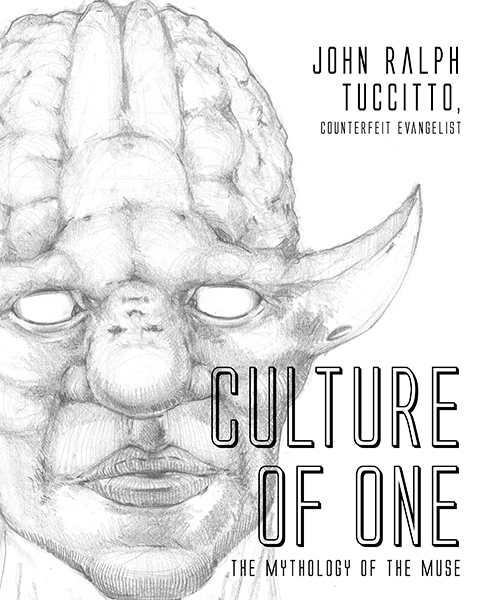It looks like you've stumbled upon a page meant to be read by our code instead of viewed directly. You're probably looking for this page.
Culture of One
The Mythology of the Muse
Culture of One is a demanding work of interactive religious exploration.
In Culture of One, John Ralph Tuccitto argues God’s truth as an ironic evangelist.
The book begins with a quiz—an exercise that introduces its interactive format, which mirrors Tuccitto’s own lifelong inner dialogue. The text that follows relates episodes of psychosis and depression, through which Tuccitto came face to face with his demons. These episodes of mental illnesses come out in scattered sentences that foreground the addressee as an integral character in the book.
The book’s chapters plunge into topics that range from theological to psychological to political, all following Tuccitto’s quest to answer the neverending question, “why?” Freedom, censorship, and gender roles are confronted, and the text is shocking (and at times offensive) as it exposes controversial viewpoints. Still, the overall tone of the book is calm and controlled. One lucid, pithy chapter begins with an anecdote about receiving an undesired gift; unlike other chapters, it sticks with its central idea and illustrates it with a concrete event.
Throughout, repeated phrases about compromise, God’s forgiveness, love, and joy reiterate the book’s notion that people can option out of the contentiousness that controversial topics incite. But the book’s pacing is relentless, and its string of arguments and counterarguments is at times difficult to follow. Most chapters progress in a downward spiral that leads to the same end: God and the culture of one.
At first, this work seems tedious and frustrating: why bring up new topics when the conclusion is always the same? The answer comes by way of a dare to get to the bottom of “why?” The more answers elude Tuccitto, the more one “why?” seems to lead to another, and the more surrender to God seems to be a possible source of relief. Thus, the book’s ironic point is made: that the only way to a culture of one is by risking circuitous paths. The book includes a reassurance that its cyclical process of seeking and surrendering gets easier with practice as it works toward another quiz, encouraging audience involvement in ongoing dialogues about faith and conviction.
Also in the course of the text, many other characters are taken on as contrasts and opponents to the culture of one. Tuccitto has conversations with Muse, Vanity, and other nemeses, showing how they can entice people away from God. Judas is held up as an ironic example of the importance and merit of going astray. These figures’ voices sound like Tuccitto’s, though, making the dialogues seem one-sided and repetitive. Only Tuccitto seems fully developed by the end, and his overwhelming dominance results in a palpable sense of both his psychological oppression and why he finds God’s appealing, as a solo author outside of his own head.
The drawings that accompany the chapters stand out even more than their words. They are provocative, intricate pencil sketches that depict disfigured people and figures that are connected in mysterious, fantastical ways. These stark visualizations complement the book’s dense, philosophical prose. Playful, colorful metaphors (ink as God’s semen, a vagina as a casino, freedom and vanity like peas and carrots) also enhance the text, providing levity and conjuring earthy images that offset the many abstract concepts presented.
Culture of One is a demanding work of interactive religious exploration that seeks to answer questions about meaning.
Reviewed by
Mari Carlson
Disclosure: This article is not an endorsement, but a review. The publisher of this book provided free copies of the book and paid a small fee to have their book reviewed by a professional reviewer. Foreword Reviews and Clarion Reviews make no guarantee that the publisher will receive a positive review. Foreword Magazine, Inc. is disclosing this in accordance with the Federal Trade Commission’s 16 CFR, Part 255.
